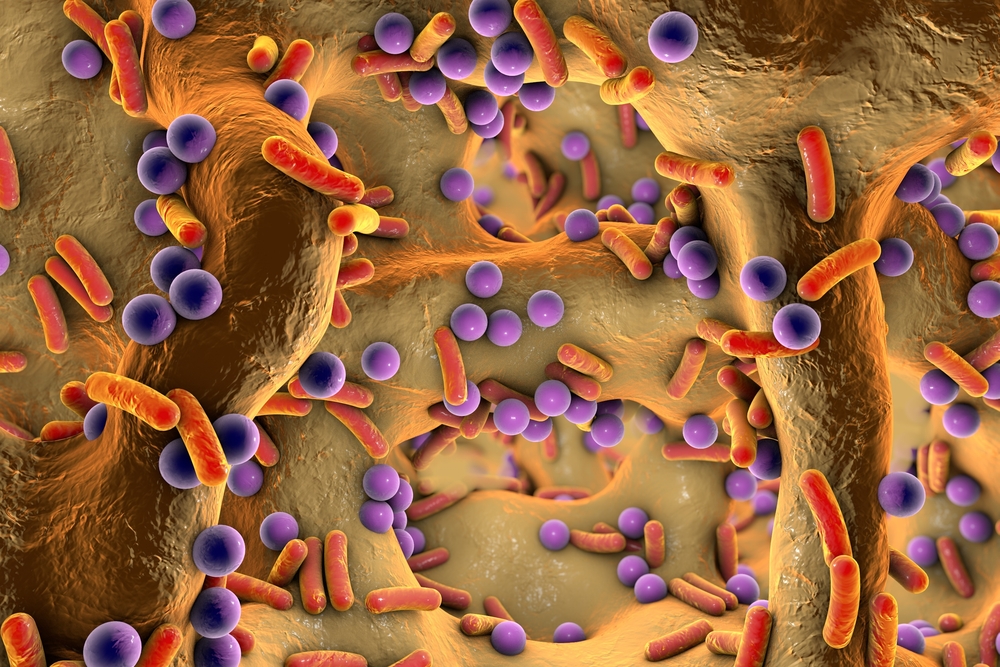Gut Microbiota Is Growing Focus of Multiple Sclerosis Research, Though Treatments Are Few
Written by |

Gut microbiota is increasingly being seen an important environmental risk factor for multiple sclerosis, and strategies to correct an imbalance in intestinal flora, also known as microbial dysbiosis, are being encouraged as ways to potentially help in the treatment of MS.
Four research articles published in the last year support the idea that gut microbiota — the ecological community of microorganisms that live in the gut — may play a role in the development of MS.
The first study, “Multiple sclerosis patients have a distinct gut microbiota compared to healthy controls,” published in Scientific Reports, found that people with relapsing-remitting MS have altered fecal microbiota and may have microbial dysbiosis. According to the team of researchers led by Dr. Ashutosh Mangalam, an assistant professor of pathology at the University of Iowa Carver College of Medicine, this could be due to factors such as stress, food habits, an overly sterile environment, sunlight, smoking, or certain infections.
“These factors could lead to an increase in harmful bacteria or a decrease in beneficial bacteria,” Mangalam told Neurology Advisor. “Any one of these factors – either alone or in combination – might be the reason for altered microbiota in MS.”
Similar results were found in children with MS, where the researchers observed disruptions in the composition of the gut microbiota. They reported their findings in the study, “Gut microbiota in early pediatric multiple sclerosis: a case-control study,” published in the European Journal of Neurology.
The third study, “Dysbiosis in the Gut Microbiota of Patients with Multiple Sclerosis, with a Striking Depletion of Species Belonging to Clostridia XIVa and IV Clusters,” published in PLOS One, analyzed the gut microbiota of Japanese patients with relapsing-remitting MS and compared it to microbiota of healthy volunteers.
These researchers found significant differences between the two groups of samples in the abundance of 21 different bacteria species, primarily belonging to the Clostridia clusters XIVa and IV and Bacteroidetes. Because the clostridial species that were reduced in the gut microbiota of MS patients did not overlap with species thought to be involved in autoimmune diseases or allergies, the authors concluded that “many of the clostridial species associated with MS might be distinct from those broadly associated with autoimmune conditions.”
The fourth study, “Type I interferons and microbial metabolites of tryptophan modulate astrocyte activity and central nervous system inflammation via the aryl hydrocarbon receptor,” conducted by an international team of researchers led by Dr. Francisco J. Quintana and published in the scientific journal Nature Medicine, showed that people with MS had reduced levels of a protein called aryl hydrocarbon receptor (AHR) circulating in their blood.
AHR is involved in many biological processes, including inflammation. The researchers found that gut microbiota play a role in turning tryptophan, and amino acid found in food, into AHR agonists, which act on cells of the nervous system called astrocytes and limit inflammation of the central nervous system. Low levels of AHR in MS patients may explain how microbial dysbiosis could be causing the condition.
All together, these results suggest that treatments targeting gut microbiota may help people with multiple sclerosis. However, research in this area is in its infancy and there are currently no such treatments available.
“Early-life maintenance of a normal microbiome could play a role in disease prevention, though it is not clear how to achieve this in an effective and sustainable way,” said Dr. Dean Wingerchuk, a professor of neurology and director of the Division of MS and Autoimmune Neurology at the Mayo Clinic in Scottsdale, Arizona.
“Gut bacteria-based drugs – or Brugs – may be available in the near future to restore normal gut flora in the treatment of MS patients,” Mangalam said.
Gut microbiota play important roles in helping us digest and draw energy from food, as well as help in the development of a healthy immune system. Microbial dysbiosis is involved in many diseases, from diabetes to rheumatoid arthritis and from cardiovascular disease to colorectal cancer.





